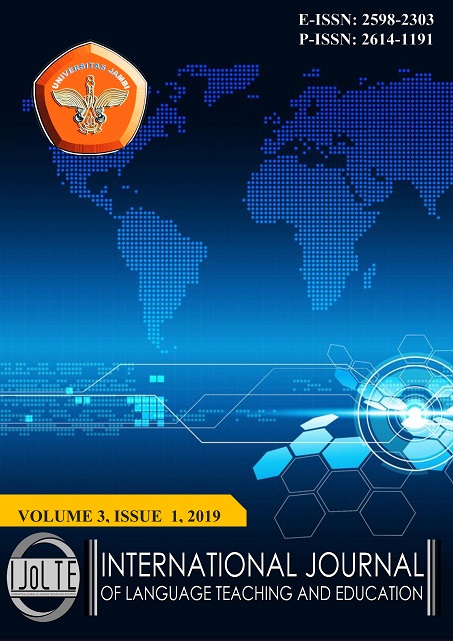“DEFENDS†as An Effective Writing Strategy to Create Students Creativity
DOI:
https://doi.org/10.22437/ijolte.v3i1.7146Keywords:
creative students, DEPENDS strategy, effective strategy, students creativityAbstract
In the educational process, specifically in the classroom, students must be able to produce good writing in academic writing that is relevant to the topic that is given or determined by the teacher. Most students get difficulty in learning writing moreover producing good writing. Teachers need to help the students build their habits of writing creatively. DEFENDS, a strategy that was developed by Ellis (1989,1990,1993) can help students to defend a particular position in a written assignment, improve writing strategies, facilitate writing process, and strengthen learning to learn writing skill. DEFENDS strategy gives students the means to plan before they begin writing. This strategy guides students to be an independent writer through several stages (Decide, Estimate, Figure, Express, Note, Drive, and Search). Students are demanded to have not only language skill but also other factors such as creativity. Creativity gives a contribution in education field nowadays, the issue of creativity has brought to the forefront of educational policy and practice, including the importance of creativity in writing. Research dealing with creativity in writing is needed. This research was an experimental design called post-test design using 2x2 factorial arrangements. The sample was high school students. Two instruments used by the researcher; those were writing test and creativity test. The value of Ftable at the level of significance is α = 0.05 is 4.01, while the value of Fo between columns is 5.734141. Fo between rows (16.5821) is higher than Ft at the level of significance α = 0.05 (4.01), and Fo columns by rows (9.21) are higher than Ft at the level of significance α = 0.05 (4.01).
Downloads
Downloads
Published
Versions
- 2019-07-24 (1)
- 2019-07-24 (1)
How to Cite
Issue
Section
License
The Authors submitting a manuscript do so on the understanding that if accepted for publication, copyright of the article shall be assigned to International Journal of Language Teaching and Education (IJoLTe) and Magister Program of English Education Department, Universitas Jambi as publisher of the journal. Copyright encompasses rights to reproduce and deliver the article in all form and media, including reprints, photographs, microfilms, and any other similar reproductions, as well as translations.
IJoLTe keep the rights to articles that have been published. And, the authors are permitted to disseminate published article by sharing the link of IJoLTe' website. Authors are allowed to use their works for any purposes deemed necessary without written permission from IJoLTe with an acknowledgement of initial publication in this journal.
IJoLTe and Magister Program of English Education Department, Universitas Jambi, and the Editors make every effort to ensure that no wrong or misleading data, opinions or statements be published in the journal. In any way, the contents of the articles and advertisements published in IJoLTe are the sole and responsibility of their respective authors and advertisers.
If the article was jointly prepared by more than one author, any authors who submitting the manuscript warrants that he/she has been authorized by all co-authors to be agreed on this copyright and license notice (agreement) on their behalf, and agrees to inform his/her co-authors of the terms of this policy. IJoLTe will not be held liable for anything that may arise due to the author(s) internal dispute. IJoLTe will only communicate with the corresponding author.
By submitting the article/manuscript to this journal, the authors agree with this policy and consciously agree that IJoLTe does not provide royalties or other fees to the authors for their published articles. By agreeing this policy, IJoLTe ensures that published articles are publicly accessible and will be free of charge for the readers. No specific document sign-off is required.
Users of this website will be licensed to use materials from this website following the Creative Commons Attribution 4.0 International License. Please use the materials accordingly
You are free to:
- Share — copy and redistribute the material in any medium or format
- Adapt — remix, transform, and build upon the material for any purpose, even commercially.
- The licensor cannot revoke these freedoms as long as you follow the license terms.








1.png)
